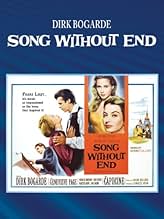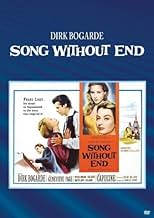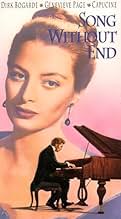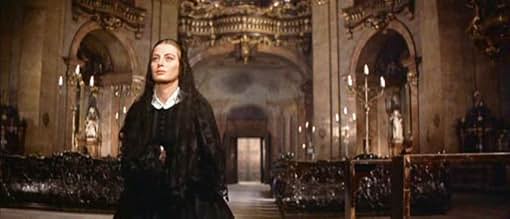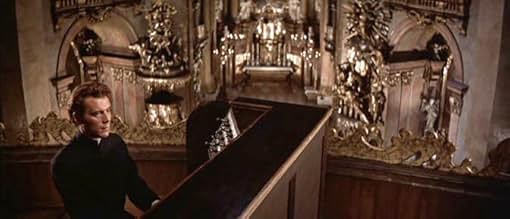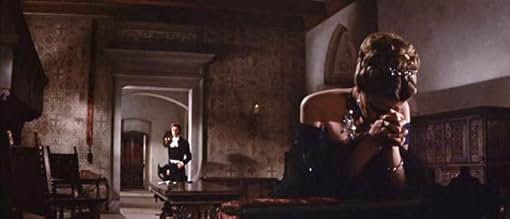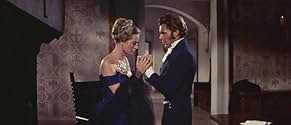L'histoire romantique du pianiste hongrois Franz Liszt, dont l'histoire d'amour scandaleuse l'a contraint à abandonner son public adoré.L'histoire romantique du pianiste hongrois Franz Liszt, dont l'histoire d'amour scandaleuse l'a contraint à abandonner son public adoré.L'histoire romantique du pianiste hongrois Franz Liszt, dont l'histoire d'amour scandaleuse l'a contraint à abandonner son public adoré.
- Réalisation
- Scénario
- Casting principal
- Récompensé par 1 Oscar
- 2 victoires et 3 nominations au total
- Thalberg
- (as E. Erlandsen)
- Chopin
- (as Alex Davion)
- Emissary
- (scènes coupées)
- Audience Member
- (non crédité)
- Komparsenrolle
- (non crédité)
Avis à la une
The set decorations here are phenomenal, they're on par with the great 1944 film "Wilson."
The music is magnificent although we could have done without knowing about the friendship between Liszt and the anti-Semite Richard Wagner. Another flaw is the miscasting of Lou Jacobi as Bogarde's manager. Jacobi sounded like he came out of the Catskills. This film for Jacobi came after his super performance, the year before, in the beloved "The Diary of Anne Frank." (Happy Birthday Lou as you turn 95 on Dec. 28th.)
The first part of the film deals with Liszt's career. His playing in concerts in various European countries was remarkable. The second part deals with his ill-fated love with the Countess Cathryne of Lichtenstein.
While we see that Liszt entered the priesthood when his proposed marriage to Cathryne was rejected, we really can't tell if Cathryne became a nun. I imagine no since she was still technically married in the eyes of the church. Nonetheless, we have a powerful, beautifully acted film. Too bad that Totentanz, a Liszt masterpiece, was not played here. I had to know that piece of grand music in a required music course at college. Like the movie, Totentanz was a masterful piece.
I thrilled to the bombast and impossible fingerwork of Hungarian Rhapsody No. 2. But the final piece Liszt (portrayed by Bogarde) played as he retreated to the monastery haunted me throughout my teenage years. Liebestraume No. 3 ("Dreams of Love") can either be a soothing balm or a cutting knife for the lovesick.
Bogarde, who obviously knew his onions about piano playing displayed the exact fingerwork on the proper fields of the keyboard and his body English was totally convincing. Well after all, he was not only an actor but a true artist - an accomplished writer and a painter.
Capuccine, touted as one of the most beautiful women at the time, portrayed the Princess of Witgenstein. But my heart fell for the jilted wife, the Belgian countess portrayed by Genevieve Page whom I found more,"simpatica."
I will always remember that performance of ' Les Prelues'as being the most powerful that I have ever heard even from the best symphony orchestras.The performances of the late Jorge Bolet are magnificent.Especially during the clever arrangement of the Concerto/Hungarian Fantasia. It is clear that Dirk Bogarde is not playing the piano,yet one cannot help but take pleasure in the greatness of the music whomever is playing.
The producer of the film also takes great pains in letting the audience know that Franz Liszt often performed the music of other composers like Wagner and Berlioz.He also was a great fan of Chopin. This is addressed in the film with care and intelligence.
I remember this film as a child and can still remember the great music.Thank God! for the score from Song Without End.
The film only covers part of Liszt's life and concentrates (naturally) on the turmoil in his love affairs, which leads to his attempt to marry the already married Princess Carolyne Wittgenstein; he left his married girlfriend, Countess Marie D'Agoult, the mother of his children for her. (One of his daughters, Cosima, married Richard Wagner, who features in this film.) I disagree with a previous comment complaining about the way Liszt is portrayed. While it's not emphasized, it is obvious that he was a man of great charity, donating many of his fees to various organizations, and playing many benefit concerts. Later on, he concentrated on composing, at which he was very successful. As a performer, Liszt was a bona fide rock star in his day, complete with hysterical fans. He was most certainly attractive to women and religiously conflicted.
Dirk Bogarde does a sensational job as Liszt. This and "The Angel Wore Red" were his only Hollywood films. Even if they had been successful, it's doubtful Bogarde would have stayed in the states, as he probably wouldn't have been cast in the kinds of films he wanted to make and/or the kinds of parts he wanted to play. He makes a very romantic, intense Liszt, and his fingerings are nothing short of amazing. Capucine is good, if a little wooden, as Carolyne. The supporting cast is very good.
The production and costumes are opulent, but they are dwarfed by the music. Definitely some of the most brilliantly performed classical music in film.
Highly recommended for classical music lovers.
Le saviez-vous
- AnecdotesCharles Vidor had completed about 15 percent of this movie when he died of a heart attack on June 4, 1959. Sir Dirk Bogarde later recalled that he was "secretly relieved" by Vidor's death, since he and his co-star, Capucine had been treated badly by the short-tempered director. Vidor would often scream at Capucine to relax, and at one point, Bogarde recalled, "shook her like a dead cat." Vidor was replaced by George Cukor, who got along much better with his stars, and was more of an "actor's director."
- GaffesGrand Duchess make reference to "Ukraine" in one scene. The term was not in wide use in the 1840s, especially not among Russian nobility.
- Citations
Countess Marie: I met Franz at a musical party. I remember he played a ballade in A-flat major by Chopin. I thought I'd never seen anything as beautiful as Franz looked when he sat at the piano. I... I wanted to cry. He watched me as he played; Franz never fails to notice a pretty woman in his audience. Afterward, he followed me into the hall. I remember he said, "May I escort you somewhere, madame?" And I said, "Yes." And he said, "Where?" And I said, "Paradise." He didn't smile - he said, "I'll call a carriage."
Princess Carolyne: Did he?
Countess Marie: What?
Princess Carolyne: Drive you there - to paradise?
Countess Marie: [a pause, and a meaningful look as she turns to leave the room] He doesn't know the road, madame.
- ConnexionsFeatured in Film Profile: Dirk Bogarde (1961)
Meilleurs choix
- How long is Song Without End?Alimenté par Alexa
Détails
- Durée2 heures 21 minutes
- Rapport de forme
- 2.35 : 1
Contribuer à cette page



